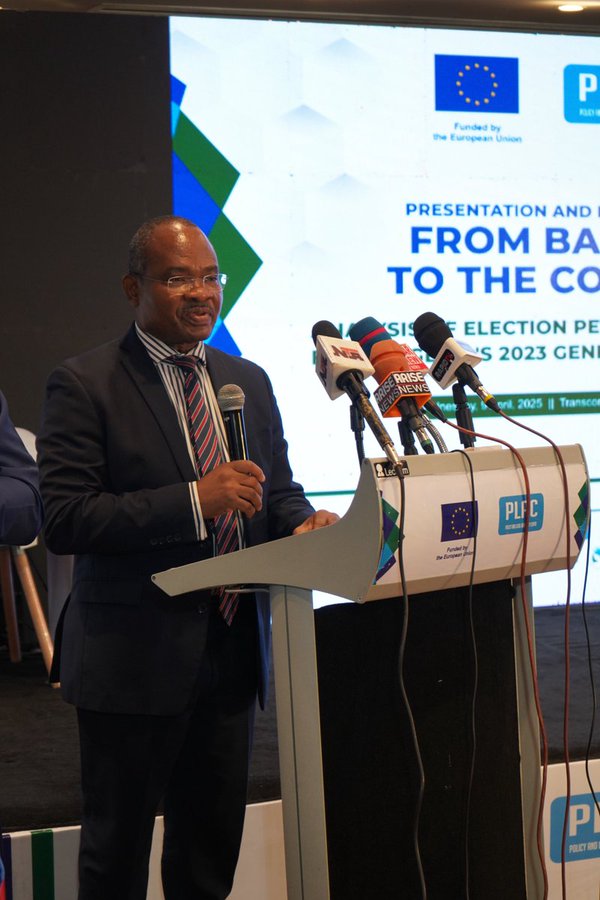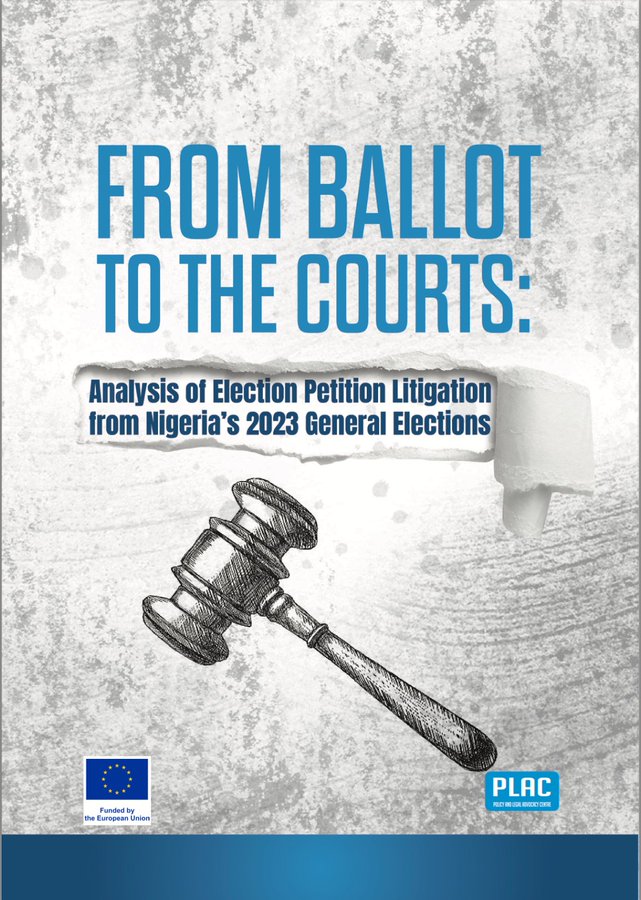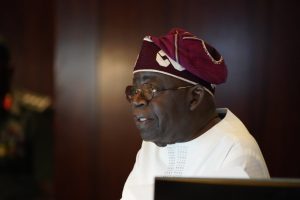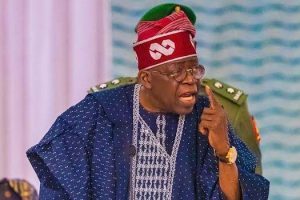A comprehensive new report by the Nigerian advocacy group, the Policy and Legal Advocacy Centre (PLAC), has delivered a damning assessment of the country’s election petition process following the contentious 2023 general elections, revealing an overwhelming failure rate for legal challenges and exposing a litany of systemic issues within the judicial handling of electoral disputes.
The PLAC report, “From Ballot to the Courts: Analysis of Election Petition Litigation from Nigeria’s 2023 General Elections,” launched in Abuja on Wednesday, meticulously dissected the judgments delivered across all levels of the judiciary – from the initial Election Petition Tribunals up to the Supreme Court – in response to the myriad of petitions filed after the February and March 2023 polls. The study critically evaluated these judicial outcomes against Nigeria’s constitutional and legal framework, notably the 1999 Constitution and the 2022 Electoral Act.
Speaking at the launch, the Executive Director of PLAC, Clem Nwankwo said one of the most alarming findings of the PLAC analysis was the sheer futility faced by those challenging election results. At the initial Election Petition Tribunals, an astonishing 88.9% of the 895 cases examined were unsuccessful, with a mere 11.1% yielding a positive outcome for the petitioner. This pattern of failure persisted at the appellate level, with the Court of Appeal dismissing 79.4% of the 588 election appeals considered, leaving only 20.9% with a successful appellant.

“The sheer scale of unsuccessful petitions casts a significant shadow over the efficacy of Nigeria’s mechanisms for resolving electoral disputes,” the report asserted, raising fundamental questions about whether the system adequately serves its purpose of ensuring electoral justice.
Burden of Proof, Procedure, and Jurisdiction: Key Hurdles
The PLAC report identified several recurring reasons for the dismissal of petitions. The most significant was the inability of petitioners to discharge the legal burden of proof, accounting for 73.1% of dismissed cases. Procedural missteps accounted for a further 14.7%, while 8.5% of petitions were dismissed due to the tribunals lacking jurisdiction, often because the issues raised were deemed to be pre-election matters. A lack of legal standing for the petitioner to even file a case led to the dismissal of 3.7% of petitions.
The issue of jurisdiction proved particularly problematic, with petitioners frequently attempting to raise pre-election disputes – concerning candidate nomination and qualification – at the tribunals, despite clear constitutional and legal provisions mandating that such matters be addressed before the actual vote. This misapplication of the legal framework was identified as a major source of conflicting judgments across different courts and tribunals, further muddying the legal waters.
Procedural hurdles also proved to be significant stumbling blocks. Petitioners often failed to comply with the strict timelines and filing requirements stipulated by law and court rules. A particularly contentious requirement was the need to “frontload” the written statements of subpoenaed witnesses within the 21-day window for filing petitions, a rule many legal practitioners consider unrealistic and unfair.
Evidentiary Challenges and INEC’s Role
The burden and standard of proof in election petitions emerged as a formidable obstacle. Petitioners consistently struggled to meet the high legal threshold for substantiating their claims, particularly when it came to obtaining critical documentary evidence from INEC. Litigants faced difficulties in presenting credible oral testimony and in securing vital materials such as the Bimodal Voter Accreditation System (BVAS) machines and the data they contained.
The report highlighted the controversial reconfiguration of BVAS data by INEC between the federal and state-level elections in 2023, which effectively rendered the data on the machines of limited evidential value by the time hearings commenced. Despite this, the Supreme Court still mandated the physical production of these machines in court, while lower courts issued contradictory rulings on the matter, adding to the confusion.
Furthermore, the legal status of the electronic transmission of results and the INEC Result Viewing Portal (IReV) remained a significant point of contention and evidentiary complexity. Petitioners also encountered substantial difficulties in proving serious allegations such as criminal misconduct, overvoting, and voter disenfranchisement, even with the introduction of a new provision in the Electoral Act aimed at addressing the dumping of documentary evidence.
Nigeria’s Electoral Body Promises Improvements After Damning Petition Report
Nigeria’s Independent National Electoral Commission (INEC) has pledged to enhance the integrity of future elections, following a critical report highlighting significant failures in the handling of petitions arising from the 2023 polls.
Speaking on behalf of INEC Chairman Professor Mahmood Yakubu at the launch of the Policy and Legal Advocacy Centre (PLAC) report on Wednesday, the Commission’s Director of Litigation and Prosecution, Tanimu Inuwa, a Senior Advocate of Nigeria (SAN), stated that INEC is “doing everything possible” to improve the electoral process.
Mr. Inuwa also revealed that the Bimodal Voter Accreditation System (BVAS), a key technology used to verify voters, is currently being understudied with the aim of enhancing its performance in advance of future elections. The BVAS system was a central point of contention in many of the election petitions analyzed in the PLAC report, with issues surrounding its data and accessibility cited as major challenges for those challenging results.
The INEC representative further stated that the Commission welcomes public scrutiny and believes that electoral administration in Nigeria has improved. As evidence of this progress, he pointed to a narrowing of the margins of victory in recent elections.
Looking ahead, Mr. Inuwa offered assurances to Nigerians of “better polls in 2027,” the year of the next general elections in the country.
PLAC was also critical of INEC’s conduct during the litigation process, describing it as “largely passive” due to the legal “presumption of regularity” of election results and a perceived belief that a “perfect” election is unattainable. However, the report noted instances where INEC actively defended petitions and filed appeals, actions seen by some as partisan and an abuse of court processes. Crucially, INEC’s frequent failure to produce requested documents for petitioners often led to the collapse of their cases, further eroding public trust in the electoral and judicial process.
Sweeping Recommendations for Reform
In light of these findings, the PLAC report offered a comprehensive set of recommendations aimed at overhauling the election petition process and restoring public confidence. Key proposals include:
- Procedural Adjustments: Revising procedural requirements, particularly the frontloading of witness statements, to ensure fairness and practicality.
- Legislative Review: Reconsidering the “substantial non-compliance” threshold for invalidating elections and clarifying the legal status of electronic result transmission.
- Burden of Proof: Shifting the burden of proof in election petitions to INEC to ensure greater accountability.
- Consequences for Non-Compliance: Imposing strict penalties on INEC officials for disobeying court orders to produce crucial election documents.
- Judicial Efficiency: Abridging timelines for pre-election matters, reducing levels of appeal, and mandating that tribunals consider the substantive merits of cases rather than dismissing them solely on preliminary issues.
- Judicial Integrity: Strengthening the capacity and independence of the judiciary, sanctioning errant judicial officers to address conflicting judgments, and improving transparency through measures like timely publication of judgments and online access to court proceedings.
- Political Party Responsibility: Strengthening internal party processes, particularly in the recruitment and training of effective polling agents, who serve as crucial witnesses.
- Alternative Dispute Resolution: Exploring the incorporation of alternative dispute resolution (ADR) mechanisms for post-election disputes where parties agree.
- Penalizing Frivolous Petitions: Implementing penalties for both individual petitioners and political parties that file baseless or vexatious suits.
The report also emphasized the urgent need to improve the working conditions of judicial officers handling election petitions and to increase the overall number of judges to prevent delays. Furthermore, it stressed the importance of strengthening the perception of judicial independence by fully implementing financial autonomy, enhancing accountability, and insulating judges from political interference.
To enhance transparency and access to information, PLAC has integrated an online database containing summaries of election petitions and judgments. This resource aims to provide legal professionals, researchers, and the public with a curated collection of decisions from the 2023 post-election litigation.
The overarching message of the PLAC report is a stark warning about the current state of Nigeria’s election dispute resolution system and an urgent call for fundamental reforms to safeguard the integrity of the democratic process and restore public faith in the judiciary’s ability to deliver electoral justice.





Add Comment